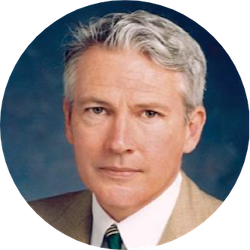Panel - 1
World Order after Covid-19 Forum
Applied History and Future Scenarios
Panelists
Angus Burgin, Chair
Associate Professor of History, Johns Hopkins University
Participant Bios

Douglas Dillon Professor of Government, Harvard Kennedy School
Graham T. Allison is the Douglas Dillon Professor of Government at Harvard University where he has taught for five decades. Allison is a leading analyst of national security with special interests in nuclear weapons, Russia, China, and decision-making.
Allison was the “Founding Dean” of Harvard’s John F. Kennedy School of Government, and until 2017, served as Director of its Belfer Center for Science and International Affairs which is ranked the “#1 University Affiliated Think Tank” in the world.
As Assistant Secretary of Defense in the first Clinton Administration, Dr. Allison received the Defense Department's highest civilian award, the Defense Medal for Distinguished Public Service, for "reshaping relations with Russia, Ukraine, Belarus, and Kazakhstan to reduce the former Soviet nuclear arsenal." This resulted in the safe return of more than 12,000 tactical nuclear weapons from the former Soviet republics and the complete elimination of more than 4,000 strategic nuclear warheads previously targeted at the United States and left in Ukraine, Kazakhstan, and Belarus when the Soviet Union disappeared.
Dr. Allison’s latest book, Destined for War: Can America and China Escape Thucydides’s Trap (2017), is a national and international bestseller. His 2013 book, Lee Kuan Yew: The Grand Master’s Insights on China, the United States and the World, has been a bestseller in the U.S. and abroad. Nuclear Terrorism: The Ultimate Preventable Catastrophe, now in its third printing, was selected by the New York Times as one of the "100 most notable books of 2004." Dr. Allison's first book, Essence of Decision: Explaining the Cuban Missile Crisis (1971), ranks among the all-time bestsellers with more than 500,000 copies in print.
As "Founding Dean" of the modern Kennedy School, under his leadership, from 1977 to 1989, a small, undefined program grew twenty-fold to become a major professional school of public policy and government.
As Assistant Secretary of Defense under President Clinton and Special Advisor to the Secretary of Defense under President Reagan, he has been a member of the Secretary of Defense’s Advisory Board for every Secretary from Weinberger to Mattis. He has the sole distinction of having twice been awarded the Distinguished Public Service Medal, first by Secretary Cap Weinberger and second by Secretary Bill Perry. He has served on the Advisory Boards of the Secretary of State, Secretary of Defense, and the Director of the CIA.
Dr. Allison was the organizer of the Commission on America's National Interests (1996 and 2000), a founding member of the Trilateral Commission, a Director of the Council on Foreign Relations, and has been a member of public committees and commissions, among them the Baker-Cutler DOE Task Force on Nonproliferation Programs with Russia, the IAEA’s Commission of Eminent Persons, and the Commission on Prevention of Weapons of Mass Destruction, Proliferation, and Terrorism.
Dr. Allison has served as a Director of the Getty Oil Company, Natixis, Loomis Sayles, Hansberger, Taubman Centers, Inc., Joule Unlimited, and Belco Oil and Gas, as well as a member of the Advisory Boards of Chase Bank, Chemical Bank, Hydro-Quebec, and the International Energy Corporation.
Dr. Allison was born and raised in Charlotte, North Carolina. He was educated at Davidson College; Harvard College (B.A., magna cum laude, in History); Oxford University (B.A. and M.A., First Class Honors in Philosophy, Politics, and Economics); and Harvard University (Ph.D. in Political Science).

Herbert Wechsler Professor of Federal Jurisprudence, Columbia Law School
Philip Bobbitt is a leading constitutional scholar and influential writer on constitutional law and theory. His early work including Constitutional Fate and Constitutional Interpretation first identified the six fundamental forms of constitutional argument. His later work has concerned the nature of the constitutional order and its relationship to international security.
His recent teaching, essays, and best-selling books address the most challenging issues of the day, including presidential impeachment, responses to terrorism, and coming changes in world order.
Bobbitt has written 10 books, including the award-winning The Shield of Achilles: War, Peace and the Course of History, and the international best-selling Terror and Consent: The Wars for the Twenty-First Century, which examine the evolution of the State and the corresponding changes in the nature of warfare. His first book, Tragic Choices, written with Guido Calabresi, is a foundational text for the study of societal values and the trade-offs they command. His most recent work is a new edition of the authoritative Impeachment: A Handbook, written in 1974 by former Columbia Law Professor Charles Black. Impeachment, he notes, will not tell law students what to think about constitutional problems, but “how to think’’ about them.
Bobbitt, who began teaching at Columbia Law School in 2007, has served in the federal government through seven presidential administrations. Among these posts, he was formerly Associate Counsel to the President for intelligence and international security; the Legal Counsel to the Senate's Iran-Contra committee; the Counselor on International at the State Department; and the senior director for strategic planning at the National Security Council. He has been a member of the Secretary of State’s Advisory Committee on International Law and most recently, a member of the External Advisory Board of the CIA.
Bobbitt has been elected a Fellow of the American Academy of Arts and Sciences, and the Royal Historical Society. He is a Life Member of the American Law Institute, and a member of the Council on Foreign Relations, the Pacific Council on International Policy, and the International Institute for Strategic Studies. He is a former trustee of Princeton University.

Associate Professor of History, Johns Hopkins University
Angus Burgin is Associate Professor of History at Johns Hopkins University, focusing on the intellectual history of political economy since the late 19th century. He is author of The Great Persuasion: Reinventing Free Markets since the Depression (Harvard University Press, 2012), co-executive editor of the book series Intellectual History of the Modern Age, and co-editor of the journal Modern Intellectual History.
He is currently writing a book on the language of technological revolution since the Second World War, which ranges across the intellectual histories of automation, entrepreneurship, postmodernism, globalization, cyberspace, and neoliberalism.

Milbank Family Senior Fellow, Hoover Institution, Stanford University
Niall Ferguson, MA, D.Phil., is the Milbank Family Senior Fellow at the Hoover Institution, Stanford University, and a senior faculty fellow of the Belfer Center for Science and International Affairs at Harvard. He is also a visiting professor at Tsinghua University, Beijing.
He is the author of fifteen books, including The Pity of War, The House of Rothschild, Empire, Civilization and Kissinger, 1923-1968: The Idealist, which won the Council on Foreign Relations Arthur Ross Prize. He is an award-making filmmaker, too, having won an international Emmy for his PBS series The Ascent of Money.
For the past five years he has written a weekly column for the Sunday Times (London), also published by the Boston Globe and the Neue Zürcher Zeitung, amongst other newspapers. It has just been announced that he is joining Bloomberg Opinion as a columnist. In addition, he is the founder and managing director of Greenmantle LLC, a New York-based advisory firm, and a co-founding board member of Ualá, a Latin American financial technology company. He also serves as a trustee of the New York Historical Society and the London-based Centre for Policy Studies. His most recent book, The Square and the Tower, was published in the U.S. in 2018, and was a New York Times bestseller. A three-part television adaptation, Niall Ferguson’s Networld, aired on PBS in March 2020.

William H. Welch Professor of Medicine and the History of Medicine; Director, Institute of the History of Medicine
Jeremy A. Greene, M.D., Ph.D., is the William H. Welch Professor of Medicine and the History of Medicine and Director of the Department of the History of Medicine and the Center for Medical Humanities and Social Medicine at the Johns Hopkins School of Medicine.
His most recent book, Generic: The Unbranding of Modern Medicines, was published by Johns Hopkins University Press. Greene's first book, Prescribing by Numbers: Drugs and the Definition of Disease, was awarded the Rachel Carson Prize by the Society for the Social Studies of Science and the Edward Kremers Prize by the American Institute of the History of Pharmacy. In addition to published broadly about the history of disease in scholarly journals, Dr. Greene has published widely in clinical and public health journals including JAMA, the New England Journal of Medicine, the Lancet, the American Journal of Public Health, and Health Affairs, and for popular audiences such as the Washington Post, Slate, Forbes, The Atlantic, and The Boston Review, as well as broader public engagement via interviews on NPR, television news, and documentaries.
Dr. Greene received an MD and a PhD in the History of Science from Harvard University in 2005, finished a residency in Internal Medicine at the Brigham & Women's Hospital in 2008, is board certified in Internal Medicine and a member of the American College of Physicians, and continues to practice primary care medicine in a community health center in East Baltimore. His current research project, The Electronic Patient: Medicine and the Challenge of New Media is supported by grants from the National Library of Medicine, the Greenwall Foundation, and the Mellon Foundation.

Professor, University of Oxford & University of Toronto
Margaret MacMillan is a Professor of History at the University of Toronto and emeritus Professor of International History and the former Warden of St. Antony's College at the University of Oxford.
Her books include Women of the Raj (1988, 2007); Paris 1919: Six Months that Changed the World (2001) (Peacemakers in the UK) for which she was the first woman to win the Samuel Johnson Prize; Nixon in China: Six Days that Changed the World (Seize the Hour: When Nixon Met Mao in the UK); The Uses and Abuses of History (2008); Extraordinary Canadians: Stephen Leacock (2009); The War that Ended Peace (2014).
Her most recent book is History’s People (2015) and in the Fall of 2020 she will publish War: How Conflict Shaped Us. She is a Fellow of the Royal Society of Literature and of the Royal Geographical Society of Canada and an Honorary Fellow of the British Academy and the Learned Society of Wales. Margaret is also a Trustee of the Central European University in Budapest and the Imperial War Museum and sits on the editorial boards of International History and First World War Studies.
She has honorary degrees from universities including the Royal Military College, Western Ontario, Ryerson, Calgary, Memorial University of Newfoundland, McGill Toronto and the American University of Paris. In 2006 Professor MacMillan was invested as an Officer of the Order of Canada and in 2015 became a Companion. In 2018 she became a Companion of Honour (UK).